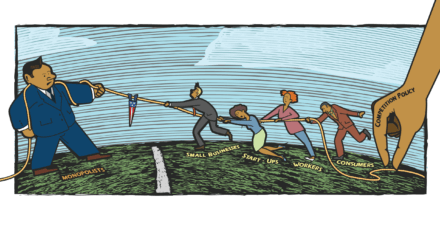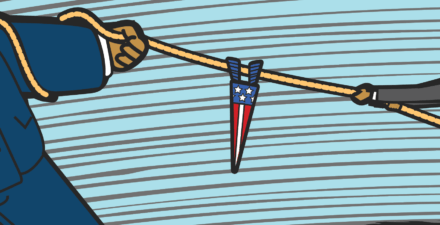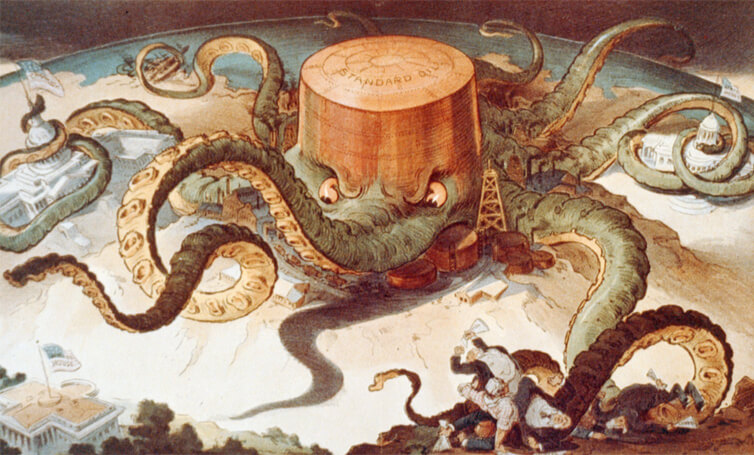Executive actions to coordinate antitrust and competition policies across the federal government


Overview
The U.S. economy is plagued by a problem of excessive market power, stemming, in part, from years of weakened competition and antitrust enforcement. Growing market power disrupts the operation of free and fair markets, and harms consumers, businesses, and workers. It exacerbates inequality and compounds the harms of structural racism.
But it is not too late to change course. A bold vision—one that relies on Congress reengaging on competition policy, the antitrust enforcement agencies adopting an affirmative agenda to strengthen deterrence, and the federal government prioritizing competition more broadly—can restore competition and benefit the country.
Executive action
One critical way to promote competition as a federal government priority is to establish a new White House Office of Competition Policy. We often equate competition policy solely with antitrust enforcement. No doubt effective antitrust enforcement is critical to stopping the improper acquisition and abuse of market power. But, at the same time, laws and regulations can directly affect competition.
Just one case in point is the Federal Trade Commission’s Prescription Release rule, which requires eye doctors to provide patients with a copy of their prescription after the completion of an eye examination. The 1977 rule can be credited with the rise of an eyeglass retail industry separate from prescribing doctors. This rule is an important precondition for the business model of firms such as Warby Parker, EyeBuyDirect, and other prescription eyeglasses retailers.
The so-called eyeglass rule is but one example of how regulations and rules can affect competition. Too often, however, regulatory agencies miss opportunities to promote competition or, worse, issue rules that inadvertently, unnecessarily, or even intentionally undermine competition. For these reasons, the new administration should establish a White House Office of Competition Policy within the Executive Office of the President that is led by the National Economic Council and includes membership from at least the Council of Economic Advisers, the Office of Information and Regulatory Affairs, the Office of Management and Budget, and the Domestic Policy Council.
The role of the White House Competition Office would be to promote the whole government approach to improving competition in three ways.
- Promote, throughout the federal government, the promulgation or amendment of rules designed to reduce barriers to entry, open industries to entrants, promote “truth in pricing,” improve the functioning of labor markets, or otherwise improve the functioning and competitiveness of markets. There are many opportunities across the government to repeat the success of the eyeglass rule, but they may be difficult to find or require competition expertise that an agency may lack. The Office of Competition Policy would work with the various agencies to identify opportunities to make markets function more competitively. It would also aid in helping to develop solutions.
- Coordinate action by the U.S. Department of Justice or the Federal Trade Commission and other executive branch agencies, and independent regulatory commissions to tackle endemic competition problems in specific industries. Sometimes litigation and antitrust enforcement is the best solution to an anticompetitive problem. Other times, however, a regulatory agency, such as the Food and Drug Administration or the U.S. Department of Agriculture, can solve the problem more quickly and less expensively through regulation. When the FTC or DOJ identify a systemic competition problem, the Office of Competition Policy would coordinate with the relevant regulatory agencies to identify the most effective solution.
- Monitor the rulemaking process so as to discourage or prevent rules that unnecessarily inhibit U.S. labor market mobility, market entry, or otherwise amount to anticompetitive uses of regulations. As it stands, the Office of Information and Regulatory Affairs, or OIRA, within the Office of Management and Budget reviews draft rules across the executive branch for their compliance with broader policies, including competition policy. A new White House Office of Competition Policy would participate in the OIRA regulatory review process, using its expertise to assist in reviewing draft rules with competitive consequences. This would strengthen a function already performed by the White House Council of Economic Advisers.
In these three ways, this new White House Office of Competition Policy would unify the Biden administration’s approach to competition policy and promote the importance of reinvigorated antitrust enforcement for consumers, workers, and marginalized communities.







